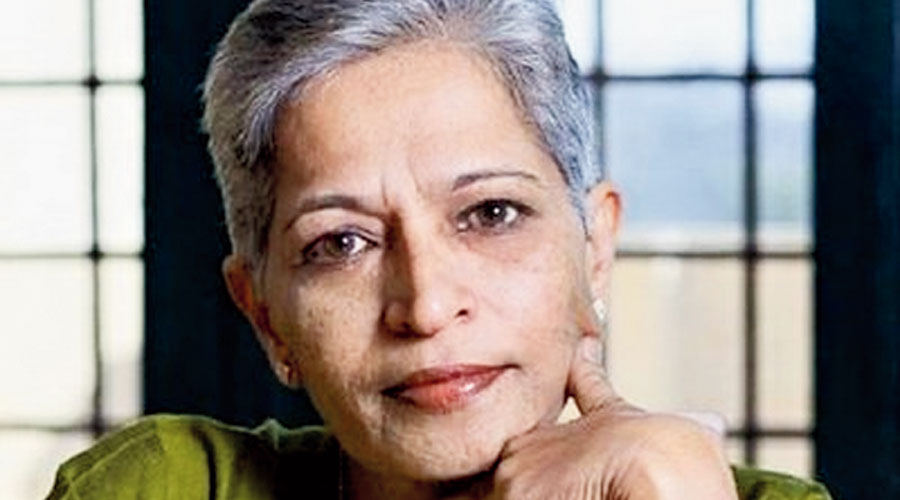The Supreme Court on Tuesday observed that Karnataka High Court had erroneously quashed the charges under the Karnataka Control of Organised Crime Act against one of the suspects in the murder of journalist Gauri Lankesh.
“You can argue lack of evidence but the high court has quashed the chargesheet itself. This is incorrect and this is in excess of the jurisdiction. It cannot be quashed like this. The high court has not analysed the chargesheet. We have to say the high court has not dealt with the chargesheet correctly,” the apex court told senior advocate Basvaraju Prabhu appearing for the accused.
The bench of Justices A.M. Khanwilkar, Dinesh Maheshwari and Ravi Kumar made the oral observations while reserving its orders on an appeal by filmmaker Kavita Lankesh challenging the high court’s judgment which quashed charges under the KCOCA against suspect Mohan Nayak in the murder of her sister.
Prabhu argued that there was no evidence to prove that Nayak was part of any organised syndicate as required under the KCOCA for being prosecuted.
However, senior advocate Huzefi Ahmadi appearing for Kavitha told the bench that even a person harbouring those accused under the act can be named as an accused under the KCOCA.
The apex court had earlier issued notices to the accused and the Karnataka government on the special leave petition filed by Kavitha challenging withdrawal of the charges under the KCOCA, 2000, against Nayak, a key accused in the murder of Gauri on September 5, 2017, outside her residence in Bangalore.
The murder was seen as an attempt to silence voices critical of the fundamentalist elements in the state.
In her petition filed through advocate Aparna Bhat, Kavita had submitted she was constrained to move the plea on her own as she was “greatly aggrieved by the impugned order and is therefore, approaching this Hon’ble Court since the State of Karnataka which is the prosecuting agency has not challenged the same”.
Her contention was that the BJP government in Karnataka should have ideally challenged the high court order which it had not done.’
According to the petitioner, the high court had erroneously quashed the order dated August 14, 2018, passed by respondent no. 3 (commissioner of police, Bangalore) granting sanction for Nayak and also quashed the supplementary chargesheet filed by respondent no. 4 (Special Investigation Team) against respondent no. 6 (Nayak) for the offences under Sections 3(1)(i), 3(2), 3(3) and 3(4) of the KCOCA. Under the said offences, the accused faced a minimum punishment of life imprisonment and the maximum of death penalty.
After the nationwide outrage over Gauri’s killing, the Karnataka government had entrusted the investigation inot the murder to the SIT. The investigation by the SIT indicated clearly that the accused persons were involved in organised crime as a syndicate and this attracted the provisions of Section 3 of the KCOCA, the petition said.
It was submitted that the investigation found that Nayak has been actively involved in providing shelter to the killers prior to and after committing the offence and has participated in a series of conspiracies, abetting, planning, providing logistics.
“Therefore, he is involved in ‘continuous unlawful activity’. With regard to Respondent No. 6’s involvement in the murder of Gauri Lankesh, the investigating agency has collected sufficient material to connect him with the case and establish his intimate nexus with the master mind behind the entire event, that is, Accused No.1 Amol Kale and master arms trainer Accused No. 8 Rajesh D. Bangera who are part and parcel of an ‘organised crime syndicate’ from its inception,” the petition stated.
According to the petition, the investigation undertaken so far has revealed that Nayak is part of the syndicate led by Kale which has committed multiple organised crimes apart from the murder of Gauri.
It was alleged that chargesheets against the members of syndicate have also been filed with respect to the murders of Narendra Dabolkar in 2013, Govinda Pansare in 2015, M.M. Kalburgi in 2015 and conspiracy to murder Prof. Bhagavan in 2018.
Yet the high court chose to quash the charges against Nayak, the petitioner said.
According to the petitioner, the alleged syndicate is involved in the following cases:
2013: Narendra Dabolkar was murdered in Pune, Maharashtra. The same syndicate is involved.
2015: Govinda Pansare was murdered at Kolhapur, Maharashtra. In connection with this case (Crime No. 39/2015), an FIR and chargesheet has been filed against Kale (leader of the syndicate), Amith Degvekar, Vasudev Suryavanshi alias Mechanic, Bharath Kurne and Sharad Kalaskar under Sections 302 and 34 of the IPC and Sections 3 and 25 of the Arms Act.
August 30, 2015: M.M. Kalburgi was shot dead. A case (Crime No. 142/2015) under Section 302 of the IPC and Section 25 of the Arms Act has been registered at Vidyagiri police station, Dharwad. A chargesheet (CC No. 2736/2019) has been filed against Kale, Ganesh Miskin, Praveen Prakash Chatur, Suryavanshi, Kalaskar and Amith Baddi for the offence punishable under Sections 120(b), 109, 449, 302, 201 and 35 of the IPC and Sections 25(1A), 25(1B) and 27(1) of the Arms Act.











